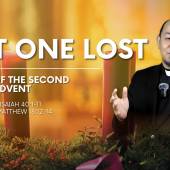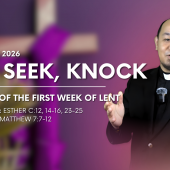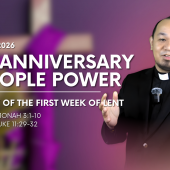Messianic Destiny

December 16, Saturday of the 2nd Week in Advent
Daily Readings: Sirach 48:1-4, 9-11; Matthew 17:9a, 10-13
“But I tell you, Elijah has already come, and they did not recognize him but have done to him everything they wished. In the same way the Son of Man is going to suffer at their hands.” (Matthew 17:12)
Malachi prophesied that the spirit of Elijah is said to “turn the heart of fathers to their sons, and the heart of sons to their fathers” (Mal. 3:24), meaning a change of heart with people.
Angel Gabriel made a similar proclamation about John the Baptist: "And he will go on before the Lord, in the spirit and power of Elijah, to turn the hearts of the parents to their children and the disobedient to the wisdom of the righteous—to make ready a people prepared for the Lord." (Luke 1:17). Elijah came to “restore all things," and John preached to “make straight the Lord’s path.” Thus, both Elijah and John the Baptist preached about repentance and called for a change of heart.
However, the religious-civil rulers of their eras persecuted both. While Elijah was persecuted by evil queen Jezebel, a follower of Baal, John the Baptist suffered death under Herod. The Son of Jesus would suffer the same fate. Just as they did not receive John the Baptist as the messenger of God, so they do not receive Jesus as the anointed Son of God.
As bearers of the name and mission of Christ through our baptism, any experience of rejection and persecution should not surprise us. Paul teaches us the right attitude of Christians toward suffering: “Now I rejoice in what I am suffering for you, and I fill up in my flesh what is still lacking in regard to Christ’s afflictions, for the sake of his body, which is the church” (Col. 1:24).
The life and mission of Elijah, the great Messianic prophet; John the Baptist - the predecessor of the Messiah; and finally Christ, the Messiah himself, were characterized by the mystery of suffering, and thus we are destined to suffer if we truly follow Christ. Our sufferings become meaningful when we suffer with Christ. Amen.
Radio Veritas Asia (RVA), a media platform of the Catholic Church, aims to share Christ. RVA started in 1969 as a continental Catholic radio station to serve Asian countries in their respective local language, thus earning the tag “the Voice of Asian Christianity.” Responding to the emerging context, RVA embraced media platforms to connect with the global Asian audience via its 21 language websites and various social media platforms.














